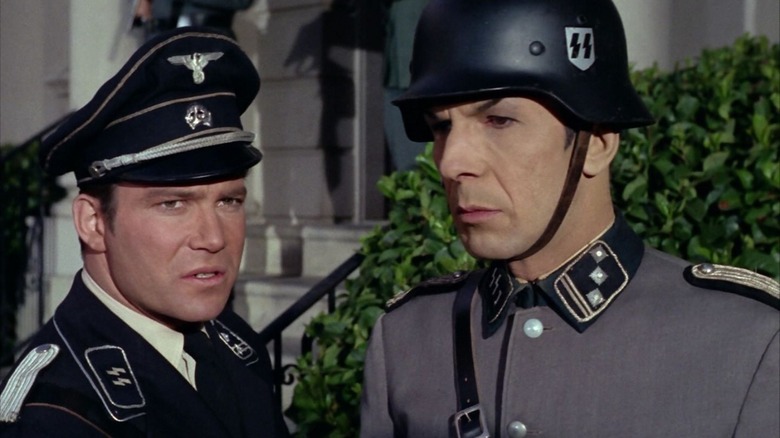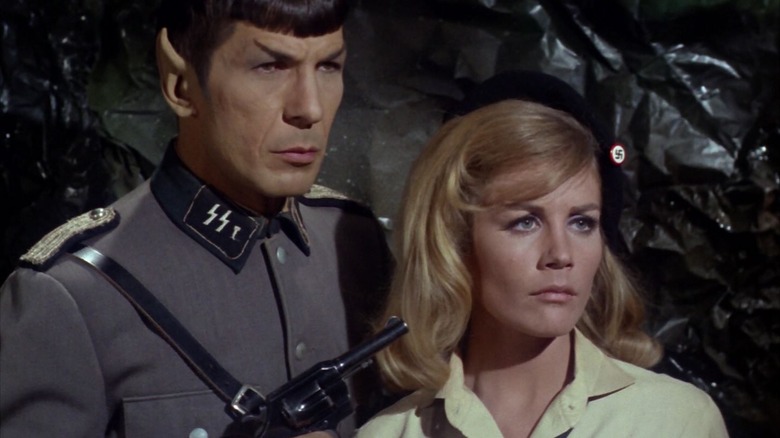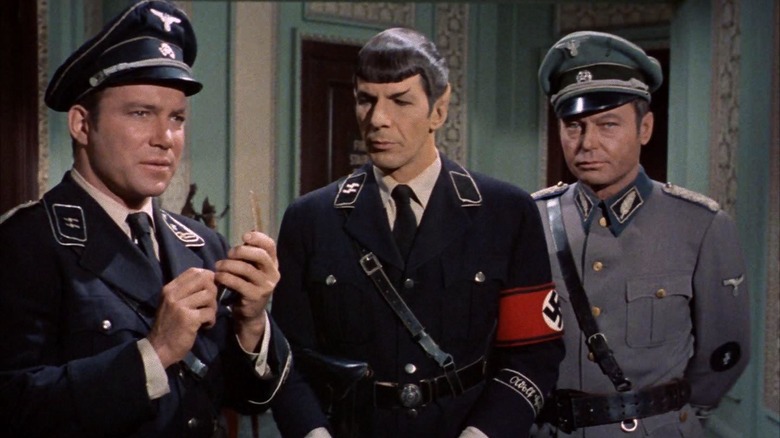Star Trek's Nazi Portrayal Got A Season 2 Episode Banned In Germany For Decades
In the "Star Trek" episode "Patterns of Force" (February 16, 1968), Kirk (William Shatner) and Spock (Leonard Nimoy) visit the pre-warp planet of Ekos to find out what happened to John Gill (David Brian), an old history professor of Kirk's. Ekos, they find, has been culturally contaminated by Gill, as he taught them all about Nazi Germany in the 1930s, and the Ekosians have rearranged their society to match. They wear Nazi uniforms, praise John Gill as their Führer, and plan to exterminate their peaceful neighbor planet Zeon. The Zeon characters have names like Izak and Abrom.
There is also a secret resistance that Kirk and Spock can hide out with, and they eventually find a way to confront John Gill. Gill, they find, has been propped up by one of the more zealously Nazi Ekosians, and has been kept in line with drugs. Gill admits that he landed on Ekos finding it to be disorganized and chaotic, and only aimed to put an efficient system into place. Shockingly, Gill came to the conclusion that Nazi Germany was the most efficient government he could think of, and implemented Nazism for practical reasons. I guess Gill was not a very good historian, otherwise he might have remembered ANYTHING ELSE about the Nazis.
There are a few scenes of Shatner and Nimoy — both Jewish actors — wearing full Nazi regalia. It's a bleak episode to be sure. Actress Valora Noland, who played the resistance fighter Daras, reportedly retired from acting after having to wear a Nazi armband for the part. The Nazi imagery and the sentiment that Nazis were the most efficient system of government ever devised kept "Patterns of Force" off German television for many years.
Postwar Germany
In Germany, the display of Nazi imagery, the flying of Nazi flags, and the vaunting of Nazi rhetoric are illegal, unless they are being presented in either an artistic or educational context. Indeed, only 11 countries around the world legally allow the display of Nazi images: Canada, Finland, Iran, Japan, Portugal, South Korea, Spain, Thailand, Taiwan, Switzerland, and the United States. Germany has also made Holocaust Denial illegal, as did they the wearing of Nazi uniforms and participation in Nazi-themed websites. A portion of their laws called Section 130 has strictly criminalized hate speech, which bans, according to Dateline, "incitement to hatred and insults that assault human dignity against people based on their racial, national, religious, or ethnic background."
Section 130 was written in the 1870s, but took on new life in the early 1950s to assure that Nazism remain silenced. It wouldn't be until 1994 that Holocaust Denial was banned explicitly.
"Patterns of Force" may fall in the exception mentioned above for "artistic context," but the makers of the episode — director Vincent McEveety and writer John Meredyth Lucas — mishandled the episode's messaging. "Patterns of Force" may end with the defeat of the Nazi regime, but not before a character explicitly complimented how efficient the Nazi Party was. Dialogue complimenting Nazis was not allowed in Germany under Section 130, and the episode was banned from broadcast. It's the only "Star Trek" episode to have that distinction.
Indeed, "Patterns" remained banned for many years. When "Star Trek" returned to German TV in the 1970s, "Patterns" was left out of the rotation. The episode wasn't dubbed into German until 1995 and only showed on pay TV in 1996. The first public German broadcast of "Patterns of Force" occurred in 2011.
The Triumph of the Will
"Patterns of Force" also included film clips of actual Nazi rallies. While Kirk and Spock are investigating John Gill, they find a store of Nazi film reels depicting scenes of Adolf Hitler in his car. These were taken from Leni Riefenstahl's infamous documentary "Triumph of the Will," a widespread piece of Nazi propaganda. "Triumph of the Will" is about the 1934 Nazi congress in Nuremberg, and shows Hitler making speeches and soldiers saluting him. For many years in American film school, "Triumph of the Will" was taught as an example of superior film technique being wielded for immoral means, and the power of media to disseminate political ugliness. Studying the making of Riefenstahl's film may offer young film students some insight. No one ever needs to actually watch it.
While "Star Trek" doesn't comment on the footage, audiences in 1968 would indeed have seen it as shocking and dark. It had only been 23 years since the end of World War II, and many people still remembered it first-hand. One can see the makers of "Patterns of Force" were trying to offer a critique of Nazism, and how easily a world can fall back into those, well, patterns of force. Fascism, the episode argues, can take hold more easily than you think.
But "Star Trek" was perhaps too objective, ignoring the terrors of the Holocaust and fliply complimenting Nazi efficiency. It's like that old saw about how fascism "at least gets the trains to run on time." Perhaps the makers of "Patterns of Force" felt that enough time had passed that they could speak objectively about Nazism. Sadly, that involved dressing Jewish actors in Nazi uniforms, and that's a hard image to get around.
In closing: punch Nazis.


